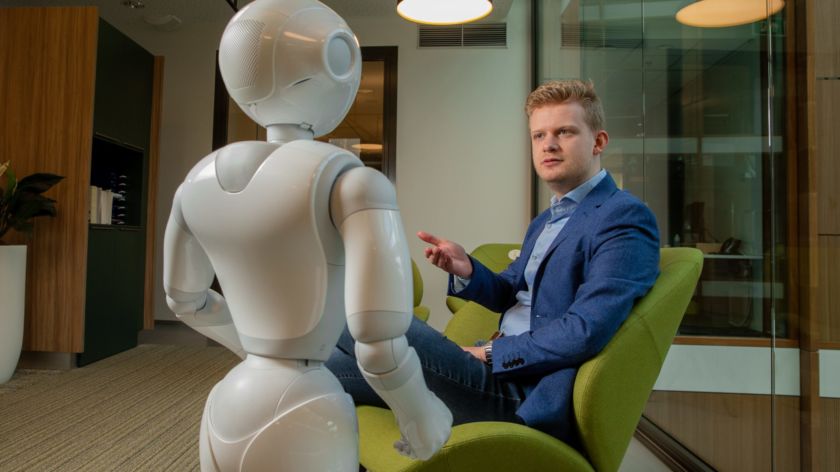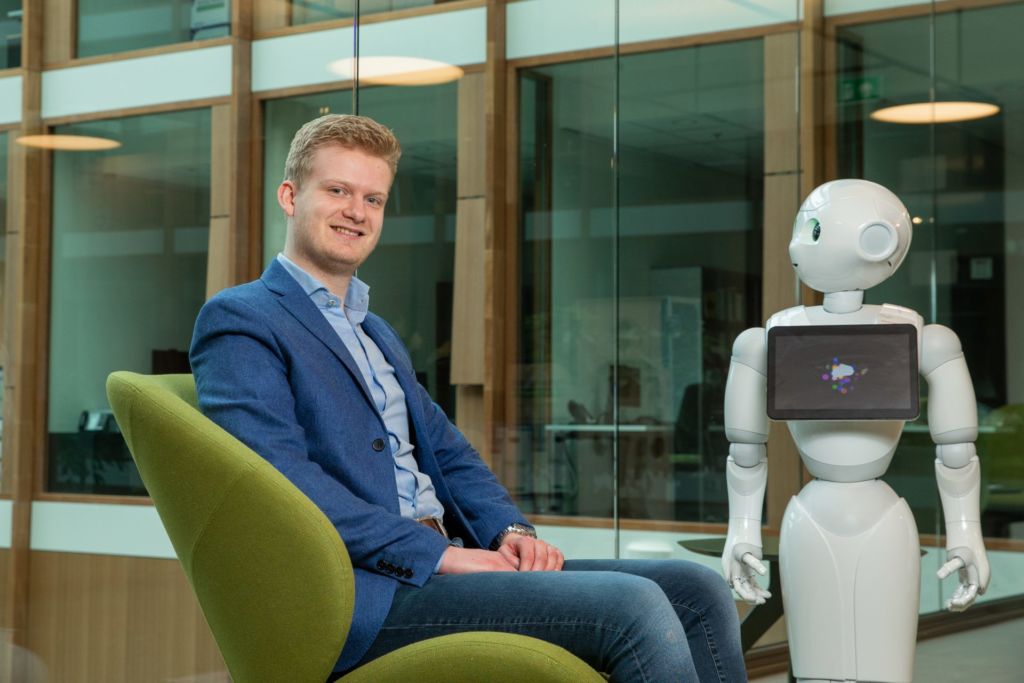Student records podcast with famous experts about the impact of new technology
-
 Koen Smeets en robot Pepper. Foto: David van Haren (met dank aan het Robotlab van Artifical Intelligence)
Koen Smeets en robot Pepper. Foto: David van Haren (met dank aan het Robotlab van Artifical Intelligence)
Economics student Koen Smeets interviewed more than fifty experts about the good and the bad sides of new technology. In his podcast he questions whether these new developments should worry us. ‘Letting the market do its thing only increases technology’s dystopian effect on society.’
An omniscient algorithm, a robot version of a deceased loved one, and killer robo-bees: the Netflix series Black Mirror reveals the dystopian side of new technology. ‘It’s alarming to see how many of the technologies from the series already exist,’ says Koen Smeets. The ambitious economics student (23) created his own interview series on disruptive technologies like artificial intelligence, social media and robotics. A new podcast episode is released every week.
Networking
‘I wanted to create an interview podcast that I would want to listen to myself,’ explains Smeets. ‘Economists often say that new technology doesn’t really have a dramatic impact on society. At the same time, technology experts say the opposite: that it has a massive impact already and will have an even bigger impact in the future. I wanted to better understand this discrepancy.’
Smeets interviewed more than fifty leading experts specialising in technology, economics or social sciences. This diverse panel of experts ranged from technology guru Andrew McAffee (not to be confused with John McAfee of the eponymous virus scanner) to innovation expert Andrea Renda and tech philosopher Charlotte Stix. The goal of the interview series is to approach the theme from as many perspectives as possible.
The fact that a 23-year-old student from Nijmegen managed to interview such illustrious experts is impressive. Smeets explains that the pandemic helped. ‘Most tech conferences are held on university campuses, but this past year they were almost all held online. ‘The pandemic gave me the opportunity to attend conferences that would have otherwise been impossible to be part of.’ That gave me the opportunity to network and attend conferences that would have otherwise been impossible to be part of.’
Relationship with Siri
Disruptive technologies are making huge strides. The arms industry is shifting towards weapons that no longer require a real person to pull the trigger. Artificial intelligence has made it possible to talk to a chat bot version of a deceased loved one. And in the United States, an autistic boy famously declared he’s in a relationship with Apple’s Siri. ‘It all reminds me of the TV series Black Mirror,’ says Smeets.

Are these developments good or bad? According to Smeets it depends on the situation. ‘A chat bot can offer comfort, but you have to be careful that people don’t lose touch with the real world. Another example is algorithms. While these aren’t biased in themselves, they can become biased with unrepresentative data and programmers’ blind spots. Google’s image recognition software categorised black people as gorillas, probably because the algorithm was largely tested on white people.’
Paid per job
In his interviews, Smeets looks beyond individual technologies to explore the way technological advancements change society and the economy. When rock star economists Martin Wolf (Financial Times) and Daron Acemoglu (MIT) joined Smeets on the first episode, they made a comparison with the Industrial Revolution of the eighteenth and nineteenth centuries. Whereas that revolution ultimately led to better jobs and higher salaries, the technological revolution may have the opposite effect. ‘Either jobs will be lost due to automation or the work that remains will become part of the gig economy, where employees get paid per job,’ says Smeets.
What are the consequences of this?
‘One result is that it will ramp up income inequality. The higher educated members of society may survive, but less educated people will struggle even more. In the United States, deaths of despair – which is when people die of suicide, drug or alcohol overdose – are on the rise. In most cases these are less-educated people who feel like they don’t have a place in society. That’s incredibly concerning. Europe is following the same trend as the United States, although fortunately not on the same scale.’
Your interviews make a strong link between the new economy and the rise of populist leaders such as Donald Trump. Why is this?
‘Trump supporters are angry for all the right reasons. Political leaders in the United States and in the Netherlands have failed to equally distribute the wealth of new technology. This isn’t technology’s fault, but the result of political choices made under the guise of neoliberalism over the past forty years.’
Trump wanted a smaller government. Is that the solution?
‘I don’t think so. Letting the market do its thing only increases technology’s dystopian effect on society. Income inequality, for example, will continue to increase.’
So what’s the solution?
‘A strong government that can keep excesses in check. Europe, with its relatively strict market regulation, is more capable of doing this than the United States. At the same time, authorities must be careful not to curtail developments. It’s important to remember that there are lots of advantages to new technology. You don’t hear anyone complaining when robots take over monotonous factory jobs if it generates better jobs in return. And video calling has helped us all stay in touch throughout the pandemic.’
‘The bottom line is that the people who benefit most from technological progress should show solidarity with the people on the short end of the stick. In my opinion, implementing a universal basic income is a great idea. This would eliminate the need to work full-time, thereby creating real breathing room in the labour market. It also has personal advantages as well. Working parents, for example, would be able to spend more time with their families.’
The podcast Socioeconomic Consequences of Disruptive Technologies can be found on YouTube and Spotify.



